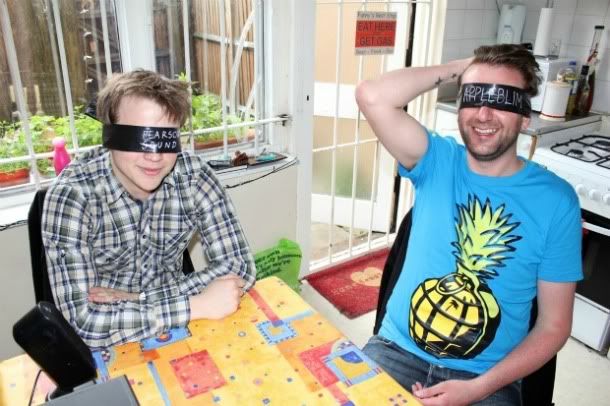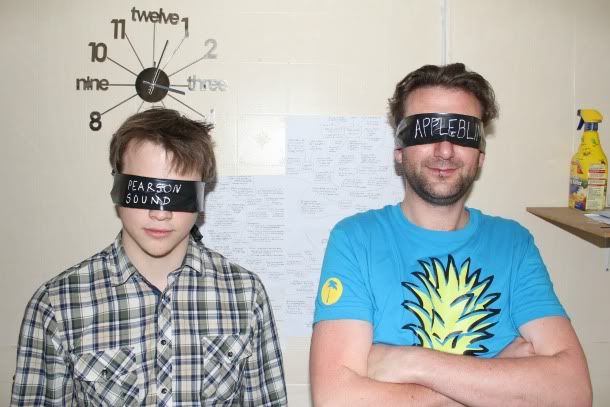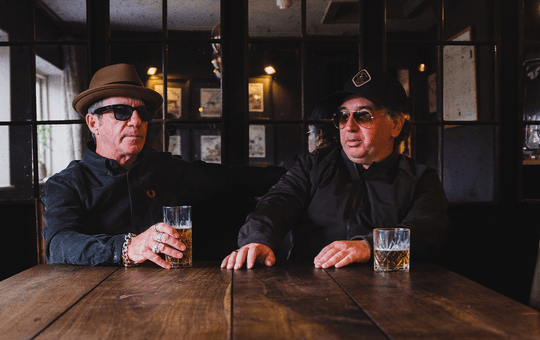Cover Up: Pearson Sound and Appleblim
It’s mid-afternoon towards the end of May. David Kennedy (Pearson Sound), Laurie Osbourne (Appleblim), photographer Gabriel and I are picking our way through the streets of north east London to the quiet of my kitchen, where I’ll later be playing them a selection of records inspired by the music they make together. Laurie’s talking us through his bag of purchases from Dalston Oxfam, enthusing about the Idjut Boys mix he found, then comparing notes with David about what they’re going to play for their joint outing that night at Plastic People. David’s going to be playing at Berlin club Berghain a day later, and debates whether he can get away with dropping some grime. Laurie tells him he should go for it. Both are in good spirits, comfortable in each other’s company, happy to talk and joke.
It’s company that’s produced some amazing results over the past few years. Individually, both are important players. David is one of the three behind Hessle Audio – the back-catalogue of which is consistently impressive – and has been releasing great records under his Ramadanman/Pearson Sound/Maurice Donovan names for several years. Laurie currently heads up the label Apple Pips, which this year alone has seen strong releases from Orphan101 and Arkist. Before that he was part of the now-defunct Skull Disco alongside fellow Bristol producer Shackleton. His influence in bringing to light the more tech-influenced side of dubstep’s development was also showcased on his mixing of ‘Dubstep Allstars: Volume 06’ back in 2008.
In 2009, Will Saul’s label Aus Music released ‘All Night Long – EP2’, the first track Sous Le Sable being a collaboration between Ramadanman and Appleblim. Dark and drawn out, beating with a techy late-night power, it’s full of tense, odd sounds and details repeatedly flowing in and out. By the end of its ten minute run, you’re not quite sure where your headspace is meant to be at. It’s a recurring feeling upon listening to the pair’s work together. That summer, Apple Pips also put out Justify, another collaboration between the two, simmering at a steady pace, a stuttering guitar note accompanied by weighty bass and drums. Then at the end of last year, the pair returned to Aus Music for Void 23. Taking the psychedelic flex of the other two releases, amped up into a busy, dark, pulsing black-hole of track, the Carl Craig remix on the flip stripping the whole thing, toning up the underlying club muscle.
The word ‘psychedelic’ is one Laurie brings up with frequency throughout the interview, questioning what that word means in terms of music to us today. It seems to be about music that holds it’s own space, mood and feel, no matter the context it’s listened to in: a track with enough transportive power on its own, and that isn’t tied to any particular circumstance, whether that be point in time or environment. The way Appleblim and Pearson Sound/Ramadanman’s releases pack ideas and eclectic samples into their work is something that definitely taps into this. The below shows some highlights from the talk.
NINA SIMONE I PUT A SPELL ON YOU
Appleblim: I know it! “I put a spell on you…” Don’t know which version it is though. Is it Ella? Nina?
Pearson Sound: Did Ella do it?
It’s Nina.
Appleblim: Right. The Nina version. Because Screamin’ Jay Hawkins did the big one didn’t he?
Yeah, he did the original. Apparently he wrote it as this nice love song, and then the producer came into the studio and got them all drunk, and they came out with this…
Appleblim: This dark, weird version… Amazing strings isn’t it? Proper strings.
Pearson Sound: Sumptuous strings… such mood…
The reason I chose to play this because it has that kind of dark, tension about it, which I definitely get from a song of yours like Void 23.
Appleblim: Hmmm… I don’t know with the darkness, tension thing. I suppose in terms of like, with moods, it’s tons of sounds, and about the friction between sounds, which is interesting… I mean, it’s not something I ever think about musically. We do what we do and it comes out like that.
Pearson Sound: I think Void was about the textures.
Appleblim: Yeah! And we definitely wanted it to be psychedelic, and have tension…
Pearson Sound: The break downs in it are pretty odd.
Appleblim: Yeah, it’s meant to just throw you out, you know? And lots of panning, and weird, like, disorienting effects and that kind of thing. And I guess the other bits of it, they just came out of what we were messing around with really. So weird samples, and making pads…
Pearson Sound: Our tunes are always very sample heavy.
Appleblim: Yeah! Just using the sound, and stretching it out, and doing those things…
JIRI KANTOR WARUM IST ALLES SO SCHNELL PASSIERT?
Appleblim: Wow… When it started I thought like Serge Gainsbourg was going to come out but it’s German, so a German Serge Gainsbourg? Hmmm.
It’s off that Endless House Foundation compilation. Which supposedly collects tracks from a Eastern European club that existed in the middle of nowhere for a few weeks in 1973…
Appleblim: Woah… The drums sound so… modern.
I know. 1973!
Appleblim: Wow! Yeah I’ve not heard of this at all. So kind of ‘70s, psychedelic… Yeah, the pads are lovely. Because you know, that’s house for me. That’s totally… Yeah that’s really nice. I’m going to check that out. That’s brilliant. It’s the kind of thing where you could play this out somewhere and no one would know if it was old or new.
It’s so displaced in terms of where it comes from.
Appleblim: Yeah, it still sounds totally relevant to me. Reminds me a bit of Hype Williams. You know what I mean? Those slow, sickly… yeah.
The reason I chose this was because it was supposedly made before any kind of concept of what we think of as clubbing existed. I was wondering, when you are making tracks, how much are you thinking about making them for a club environment?
Pearson Sound: Umm, I think, maybe when you play out more, you become, not concerned, but you want something that you can play out. I mean some people get way into doing stuff just like that, but it’s kind of nice to have other tunes.
Appleblim: I mean, I’ve not really had many tracks that have become dance-floor ‘favs’. Like David’s had some big tunes. My stuff, I don’t tend to find I hear it out very much. So is it really that danceable?
Pearson Sound: Well I never heard my stuff out until, well, a couple of years ago. Actually, you played some of my stuff quite early on?
Appleblim: Yeah!
Pearson Sound: It was really nice to hear it out!
Appleblim: Yeah, do you reckon that changed the way you then made things?
Pearson Sound: I think if you’re a kid who has never been to a club or heard a proper soundsystem, it would definitely change the way you make music. Just because you’d have no idea what the power of a soundsystem can do… But what you were saying about making stuff specifically for a dance-floor, I guess that could be a bit dangerous. Depends.
Appleblim: That’s it! When you play it out, you get to know what kind of reaction it’s getting. For me it’s not always about keeping the dance-floor, like, hyped? I don’t really mind if people stop dancing for a bit, as long as people are enjoying it. If people are stood there, you can take it weird and psychedelic, and it’s like ok, well, some people are going to go to the bar for a drink, but some people are going to stay and be into it. And then they can keep on dancing later. I’m just not that kind of person that thinks like, everyone has got to be ‘having it’ for two hours.
Pearson Sound: It’s about context as well. You can play one tune and people will go for it, some dubstep or whatever, and you can play the same tune the next night and it will completely kill it.
Appleblim: Absolutely!
THE SPECIALS GHOST TOWN
Pearson Sound: This is Ghost Town.
Appleblim: One of the greatest pop singles ever. The perfect vision of, kind of what we were saying. It’s dance-floor, you can listen to it at home, it’s political, it’s of the time, and it was number one. Perfect tune. Thumbs up.
Pearson Sound: When was it?
Appleblim: Like, ‘80s… ’82, ’83? I remember it being on Top Of The Pops. They’d be live in the studio, playing it. I was probably like 5 or something. In the ‘80s before I really knew what music is or what bands are… but the way they looked, incredible. The way they performed.
Pearson Sound: There are definitely some dubstep bootlegs of this…
Appleblim: Yeah, it’s one of those tunes, everybody likes it, everybody knows it.
I was listening to Justify, and I thought that had maybe a slightly ska rhythm to it…
Appleblim: Oooh! I hadn’t really thought of that.
Pearson Sound: It’s not the off though…
Appleblim: Yeah it’s not a straight off beat, it’s more like…
Pearson Sound: The third?
Appleblim: More like a triplet or something, yeah.
Pearson Sound: It’s a guitar sample on the Justify record.
But where did the guitar come from?
Pearson Sound: Umm, it’s a guitar…
Appleblim: Haha!
Pearson Sound: That’s where my knowledge of guitars stops!
Appleblim: Yeah… But it just like makes you think, why can’t things like this… People aren’t even making things like this any more that would be in the charts. You know, when was the last time we had a number one that had something meaningful to it? I mean, I’m not saying that pop has to be meaningful, but wow. Imagine this getting to number one now? It’s so of its time in terms of politicalness… But then everyone knows it. It’s timeless.
Pearson Sound: I read something that the last political number one was Live 8 or something.
Appleblim: Hmmm, I wonder… I mean Green Day are theoretically political. They’re kind of anti-establishment. They are getting kids to go, oh, let’s question a few things. So in a way it’s still positive…
CUTICLE APPROACHING GLOBAL/ SERENETY’S SEQUEL
Ok, next one… guitars on it. Sorry David.
Pearson Sound: Haha.
Appleblim: Woah… It’s noise and stuff… Is it like ‘70s? Sounds more modern to me…
It’s from 2011.
Pearson Sound: Is it from LA? I’m waiting to see if the beat comes in.
Yeah, it’s American.
Appleblim: No idea. It’s nice though.
It’s Cuticle, which is basically three guys in noise bands who decided to make a dance 12”. It’s been released on 100% Silk, a sub-label of Not Not Fun.
Appleblim: Ah yeah, so related to that. Yeah, it’s interesting when people from different scenes make what they perceive to be dance music. They’re effectively making psychedelic noise, but with a beat. Sounds really nice. I think it’s kind of cool to get away from Hi-fi aesthetics as well… I’m not saying it’s badly or not badly produced, but it is what it is isn’t it? All the distortion… It doesn’t matter if it’s not a perfect mix down, but it’s still got a vibe hasn’t it?
Pearson Sound: Do you think that they’re trying to do that, or that they don’t know how to do that though?
Appleblim: Well, that’s the thing. Does it matter? Just bang it down!
Pearson Sound: Yeah, because there’s quite a thing at the moment of people trying to make their stuff sound lo-fi on purpose… I’ve done it! (laughs)
Appleblim: Ha! Yeah I think anyone who has basically used any kind of, like, old tape saturation things, you’re basically trying to make it sound analogue on a digital set up. It’s all good! It’s all as relevant as anything else… It’s weird, in a way I’m not too bothered about the kick really. It’s cool, it’s functional, it’s obviously been made so you can dance, but if you took the kick away, it would be a more like, immerse yourself in it in a way.
AMERIE TOUCH
Appleblim: Sounds like Timbaland on the beats?
It might be Timbaland (actually it’s Lil Jon). It’s Amerie, Touch.
Appleblim: Yeah nice! Like the tablas… And big sub as well! That’s wicked! If you did that in a proper club, it would sound amazing. On a proper system… It’s got a boom hasn’t it? I mean any song like that has got to sound good in the clubs they play it in, so you just know the boom is going to be sick. You know Timbaland is never going to turn in a dodgy beat. It has to sound fat.
Pearson Sound: A lot of R&B and pop production is pretty out there.
Appleblim: Yeah love it! Having that song over the top of something so strange… Yeah. A really like, dance-floor rhythm, and this soul song on top.
Yeah. I just love how expensively produced every noise on it sounds. There’s dollars and dollars in every bit of it.
Pearson Sound: Yeah, if you look at a song like Drop It Like It’s Hot or something. There are about four elements…
Appleblim: Yeah, so simple but it’s like… Have you seen, there are some really wicked youtube videos of Timbaland in the studio, and people coming round like Busta and all these various other people, and sort of like listening to new beats, and being like, what have you got? It’s hilarious! Because he’s there on a keyboard and it’s like he’s using four keys, four samples, and it’s like boom bad a boom da… and the others are just like ‘yeah! Tha one! Tha one!’ And there’s another one where they’re like ‘yeah you should have seen him yesterday, he was making some beats out of pens and a paper cup! Check it out!’
How would you both feel if you were given that kind of budget and were put in those kind of studios to make something?
Appleblim: Whew! Bloody hell… Yeah, I really want to do a pop project. There’s various people in Bristol who I’m kind of like, we’re going to start trying to write like, you know, songs, you know? With vocalists. Kind of with that in mind.
Pearson Sound: It depends how you’re doing it. If you’re doing it like that, or if you’re roped in by a major, you’re a lot more, their sort of slave. And even then, I guess a lot of those tunes are produced by more than one person. Someone in the room will say ‘make a tune!’ and one person will do the lead, and it’ll all be a big mish mash. And then the singer will have their producers…
Appleblim: Yeah, so you’d rather get involved with something maybe from the very inception instead of maybe stepping in kind of?
Pearson Sound: Well yeah. It just gets messy. Like ‘I produced this’ or ‘I wrote this’…
Appleblim: Yeah, you see how many people there are working on a record and it can be mad!
Pearson Sound: Whereas the tracks we make are just us. In our bedrooms.
Appleblim: Totally different aesthetic. But I really want to get back to like, collective music making, because like, that’s where I’m from. Bands and stuff. And just recently we’ve been trying to jam more, even with just computers and synths, and instantly, it’s just so much fun!
Pearson Sound: Appleblim live maybe?
Appleblim: Ha! Yeah, we’ll see. Watch this space!
When you were both writing together, how did that work?
Appleblim: Just having a laugh really?
Pearson Sound: Eating nice sandwiches.
Appleblim: Lots of good food.
Pearson Sound: We just went down to my parents house and… actually no, the first one we did in Leeds, just hung out for a few days.
Appleblim: Yeah just having a bit of fun really. Just seeing what happens.
Pearson Sound: Not really doing stuff in the evening, just getting up early in the morning, doing stuff in the day, and then just spent the rest of the day chilling out.
Appleblim: Yeah, got on really well with all the people up in Leeds. They’re all a really nice crew. Fun to get away, we had a couple of days spare, and thought it would be nice to do something.
Pearson Sound: The first one was Justify. And we didn’t finish it in that session. And then we did another session in August, and then we wrote… we finished Justify, and then the next day we wrote Sous Le Sable in just like one day!
Appleblim: Yeah yeah! That came together… quick.
Pearson Sound: Don’t really know how! But yeah, good fun.
Appleblim: It would just be like, right, a tempo. Ok, we’ll do something at that. And everything else would be open to whatever really.
So you would decide a few key things at the start?
Pearson Sound: We would generally. We would just get shit loads of samples.
Appleblim: Yeah just try and make source sounds out of random stuff.
Pearson Sound: Because he’s just got – I mean, you, Laurie – has got a mad collection of music pillaged.
Appleblim: It’s just fun because you know all those sounds, nobody else is going to have used them.
Pearson Sound: Pretty much everything from those records is from other people. Apart from the drums.
A: Yeah, but morphed beyond… we changed it, utterly.
FOUL PLAY – SURVIVAL (REMIX)
Pearson Sound: Oooh!
Appleblim: Oh! Got to be, umm…
Foul Play.
Pearson Sound: There’s definitely nowadays a bit of a trend for this kind of thing.
Appleblim: I think people are just starting to realise how fertile rave was. Rave got a hard time, at the time, and then for a long time after.
Until not that long ago I guess.
Appleblim: Yeah, it was seen as cheesy or drug music, and also the samples they were using. You know, hip hop. The same breaks hip hop were using, in a you know, less respectful way… And all the soul, ‘80s groove records sped up. A lot of purists were not feeling it, you know? But this just goes to show…
Pearson Sound: It stands the test of time.
Appleblim: Foul Play are, you know, Steve Gurley, who obviously went on to do lots of other things… It’s lovely, it’s like, London music. I read an interesting thing with D-Bridge saying that all the records sounded like the studios, in terms of it depended what desk you had, it depended what places you got your samples from.
It’s amazing for it to be that raw that even what desk makes a big difference.
Appleblim: Yeah! They’ve basically taken all the things they’ve been brought up on, in the ‘80s and stuff, like boogie and rare groove and soul, and chopped it up and have done something different with it… It’s bonkers! It’s psychedelic! It’s entirely psychedelic, you know? But it’s got that kind of groove hasn’t it? [As pianos come in] Pianos! How can you not like a stab like that?!
Pearson Sound: It’s funny because if you listen to the original stuff like this, so much sounds like so much now. I mean if I listen to this I’m like oh, ok. But then you realise these were the first guys who did it, and you’re like oh!
Appleblim: You mean like it’s been over-written?
Pearson Sound: Yeah, I guess. Maybe.
Appleblim: Yeah yeah, I mean like, it’s hard. We talk about like ‘authenticity’ or whatever. Does it matter if someone hears this and goes this sounds like a record from now? We seem to need to know that this is like, old. That this is the original stuff, you know? Shared aesthetics between the eras. It’s pretty interesting… It’s like the old argument, has everything been done or not? I don’t really believe that it has. But obviously you could still play a load of records from 20 years ago that are going to sound just the [sic] of the ones from now. And it doesn’t make any of them any less worthwhile.
Do you both feel under any pressure to make something that pushes things out?
Pearson Sound: I’ve made some stuff with ‘90s house records…
Appleblim: I think it’s just for yourself, it’s what you want to do. As long as you’re buzzing off making music… I think personally it’s always trying to do something different each time. Just for yourself really. You could just churn out the same style and stuff, but why not try something different?
THEO PARRISH FALLING UP (CARL CRAIG REMIX)
Pearson Sound: Yes! Big tune!
Appleblim: Carl Craig!
Pearson Sound: This is probably the first one where I remember it coming out, I remember buying the record…
Appleblim: Yeah! Remember hearing it out.
Pearson Sound: I remember this came out when I was 15 I think? So I don’t really remember hearing it out but I remember being into it.
Appleblim: A classic example of a remix just being stripped down.
Pearson Sound: I thought you were going to say a remix being better than the orginal, ha! Is it Carl remixing Theo? Just checking.
Yeah.
Pearson Sound: I remember there was this crazy demand, and it was one of those ones where we thought it was really limited but actually there were thousands and thousands of them!
Appleblim: And it got bootlegged as well.
Pearson Sound: Really? Oh ok, so maybe there weren’t thousands of copies…
Appleblim: I could listen to this forever!
Pearson Sound: What I like about this one is when the kicks come in, it’s just like he’s pushed the magic button.
Appleblim: Yeah there’s a jazziness. This clipped jazziness.
Pearson Sound: Yeah, without realising it, this tune has actually been quite influential hasn’t it? Hadn’t really noticed before.
You hear it out and it always works brilliantly. Carl Craig is just… How did he end up remixing your tune?
Appleblim: Through Will Saul really.
Pearson Sound: ‘Will Saul Makes Things Happen’. Yeah.
Appleblim: We owe him a lot. He sent the track to Carl…
Pearson Sound: We didn’t even ask him to.
Appleblim: We didn’t even know this was going on. So yeah. Carl liked the tune, and he said I don’t want to remix it, I want to re-edit it. And at the beginning I was like, aww, shame. But at least it means he respects the original track, you know? And it’s interesting to hear what he did with it. Stripped it down, and made in punchier I guess. We had all this crazy psychedelic stuff going on and he just took it down and kept it rolling.
That in-built funkiness almost…
Appleblim: Yeah. And melancholy. That yearning in the synths.
Pearson Sound: And both those never quite resolving…
Appleblim: Happy sadness.
Pearson Sound: Yeah.
[The snare drum comes in]
Appleblim & Pearson Sound: Ooof!
Pearson Sound: What?!
Appleblim: I don’t remember that snare!
Pearson Sound: Haha! How will you transcribe that? “surprised faces at snare drum”?
Ha! Yeah, “surprised faces at snare drum”. You’ve said it now though, so I guess no need!
Appleblim: Pumping! Classic.
[Kick drum comes in]
Pearson Sound: Oooof!
There it is!
Pearson Sound: That’s the one I was talking about! That kick, bringing that to the tune!
Appleblim: You’d just be happy dancing away, and then it’s just like, slam it in! It really holds you, it really works! Psychedelic! It’s like, drone.
Carl Craig as psychedelic… That definitely makes sense.
Appleblim: And he was doing stuff like sampling breakbeats, which no one in techno was doing… And he was inspired by Shut Up And Dance and that lot who had been sampling him. And he heard them sampling his tunes, and then he started using breakbeats as well.
VESSEL NYLON SUNSET (PEVERELIST REMIX)
Appleblim: Oh I know this one! It’s new right?
It’s new.
Appleblim: Oh it’s that Peverelist remix of… someone that I know…
Pearson Sound: Vessel?
Appleblim: Yeah! It’s great to hear Pev drop the tempo. It’s got so much, like, space. Wow! Wicked.
Thought I’d play a Peverelist tune, since he’s released on both your labels, and he’s brilliant right?
Appleblim: Pev is just a dark horse. He can do whatever he wants. The new thing on Hessle, you can play that anywhere and, even people who are thinking ‘this is weird’ will be going nuts. If you like Jungle, if you like Drum & Bass, if you like anything… This has got so much skip in it too! This is like Pev doing 2-step or whatever… I know the guy who did the original. It’s really exciting, there’s quite a few good young producers in Bristol.
[Breakdown]
Appleblim: Phoar!
Pearson Sound: Pev!
Appleblim: You know that’s insane. Sick! It’s always so weird. Like it shouldn’t be too hard to dance to… but he’s just got the groove. And then he can do whatever he wants.
Yet another example of an amazing remix. If you guys are asked to remix tracks, how do you go about thinking about that?
Pearson Sound: Umm, it really depends. Some tunes you battle for ages, and then eventually you do something and it works, and then some you know exactly what you want to do. It’s a mixed bag really. Trying to think of some examples… With the Jamie Woon thing I kind of knew what I wanted to do, and with the Bashmore one… But I think these days remixes are mostly just used for promotion. Which isn’t the same as four years ago maybe?
Appleblim: Yeah, because I’ve had people going “we need a remix”. And the deadline’s in two weeks and I think that’s just like… To turn in a quality bit of music… you think, why do you really want this remix, you know? Like for me personally, the fun of doing the remix is really going deep on it and re-setting those sounds in a different context, paying respect to the original, but then giving it a new vibe. I think there’s a lot of things, like David said, you’ve got like five or six remixes, like the ‘soul’ remix, the ‘UK funky’ remix, it just seems to be about ticking the boxes, like you say, you know? To me that’s not a remix. A remix, you listen to the parts, you love the parts, and you go deep on them. Whereas to a lot of other people it’s obviously like, well, this is a promotional tool, you know? Rather than like, we’re doing an exchange of musical ideas.
Pearson Sound: But then sometimes you listen to a tune and you hear something you like in it, and you want to develop it your own way…
Appleblim: And that’s just it! I’m not saying that you can’t just take out one element. You know, there’s a remix by Kevin Saunderson that I love of Lighthouse Family…
I don’t know that!
Appleblim: It’s one of my secret weapons! And now I’ve just given it away!
Pearson Sound: Oh no!
Appleblim: Yeah, but he takes one bit of the vocal and loops it. And you’re like, ok, a little bit lazy, but it’s a killer tune! So that’s still a great remix to me, even though he’s probably taken literally one element and looped it up and put his own thing behind it.
Pearson Sound: He should have just taken out the vocal and done his own tune.
Appleblim: But the vocal is the key thing in it! Because there’s a dub on it as well. You’ve got to play the vocal because the vocal is so… weird. It’s trying to make Lighthouse Family sound weird.
Pearson Sound: It was all about the second guy in Lighthouse Family. The one in the background?
Appleblim: The back up guy? Where’s he?
Pearson Sound: But the singer got all the hype!
Appleblim: Haha! We need to go back in on this. Our next project is re-discovering the Lighthouse Family…
Catch Appleblim at Lovebox on the 16th July and Pearson Sound at Free Rotation festival on the 22nd July















